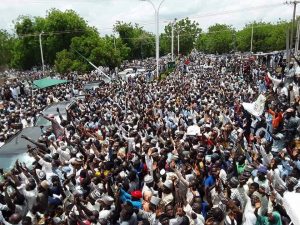The alarm has been sounded that Nigeria cannot make it without a revolutionary exit. The country has attained a degree of rot and decay that cannot be managed without a revolutionary exit, says Dr. Yima Sen, radical politician and academic. Reacting to recent events such as the morbid rupturing of the All Progressives Congress, (APC), the power tussle in Benue State, the Executive-Legislature fissure as well as Mister President’s medical leave, Dr Sen told Intervention that Nigeria is bogged down by what he called post military civil rule in which democracy does not function in a way that can guarantee even the minimum development and morality taken for granted elsewhere.

President Buhari inspecting his campaign office earlier this week and, by implication, sending a message of battle readiness for the 2019 contest even as his party has been hit by a defection Tsunami in the past one week

Big reception for major defectors from the ruling to the opposition party. President Buhari’s nemesis or the president has a last card?
Instead, said the media theorist at Baze University, Abuja, the system has been operated in a way that visits the populace with so much suffering by a leadership that is at best mediocre. Wondering why every time Nigeria is searching for leadership, it goes for a mediocre at a time only a revolutionary exit can save the country from evaporating, , Dr Sen declared “We are tired of what has been going on. The degree of the rot is such that we just have to change this place for the better”.
Describing feudalism as superior to what exists in Nigeria today, the Baze University academic and activist says this is because what exists as the system is primitive and prebendal, contending that even with oppression under feudalism, that system guarantees the privileges attached to the serf. Under the current Nigerian system there are no privileges or rights for both the rich and the poor and which, for him, shows how bad the system is now when compared to a terrible system as feudalism. That situation, said he, should show to us how urgently a revolutionary exit is needed in Nigeria.
All hopes that things would change have now evaporated, according to him, necessitating all those who might be fearful of a revolutionary change in Nigeria such as the Western world to embrace it because the current situation cannot guarantee even the most minimum conditions for investment and development. Stressing the risk in keeping Nigeria and African countries as a ghetto, Dr Sen said ghettoes are dangerous because it is not going to be possible keeping a whole part of the world as a ghetto and hope to live safely anywhere else. He dismissed any basis for fear of a revolution in Nigeria, pointing out how he, for example, has been trained in the West and how the Western thinkers he studied were neither Tivs, Igbos, Hausas nor Yoruba from Nigeria. Kant, Montesquieu, Marx and you can add Amartya Sen to the list, among many others, are all Westerners and it is what each of them brought to the table we are talking about, said Dr Sen who attended the University of Lagos in Nigeria, the University of California, Los Angeles and the University of Amsterdam in the Netherlands.

Godfather and godson before the unravelling
Connecting his analysis to the power tussle currently rocking his home state of Benue, Dr Sen said it is what a primitive and prebendal system can manifest in different parts of the country, explaining how the Benue crises is about share of spoils between godfathers and godsons. According to Sen, Samuel Ortom, the Benue State governor, who has been grateful to his benefactor has, for whatever reasons, developed fatigue and opted to return to the People’s Democratic Party, (PDP). That has irked Senator George Akume, his godfather whom, in Dr. Sen’s analysis, is like asking him: where are you going? Come here! In other words, the defection is a nationwide phenomenon in Nigeria today but it assumes different contours in different parts of the country.
The defection in Benue and the issues of the open burial for the victims of the January and subsequent killings have been troubling to Abuja, (the seat of power). Said Dr Sen: when you have power, you have power; from control of the Repressive State Apparatuses (RSA) to financial capacity. So, there are many ways you can coerce, harass, intimidate and hope to subdue a state governor within the existing system, using the Federal Might”.
The problem Dr. Sen sees in the Benue crises is, however, how a smart state governor can also raise and use their own vigilante or the youths, the outcome of which could have implications for national security. Above all, “when political leaders fight, ordinary people suffer”. Benue State, he said, has lost out in the current democratic era since 1999 whether in terms of agriculture, quality schools or health care delivery. He contrasts development in the period to what the late Aper Aku, the first civilian governor of the state, accomplished in four years, 1979 – 1983 in terms of connecting food from the farm to industry, such that there was no parts of the old Benue State that did not have an industry determined by local raw material availability: Taraku Mill based on soyabeans, Benue Burnt Bricks Factory at Otukpo, the Benue Breweries based on locally produced grains, the timber factory at Okura Lafia, now in Kogi State and the programme of land clearing for large scale farming. In all, there were 14 of such factories in addition to Lobi Bank, all of which are effectively dead now.




























